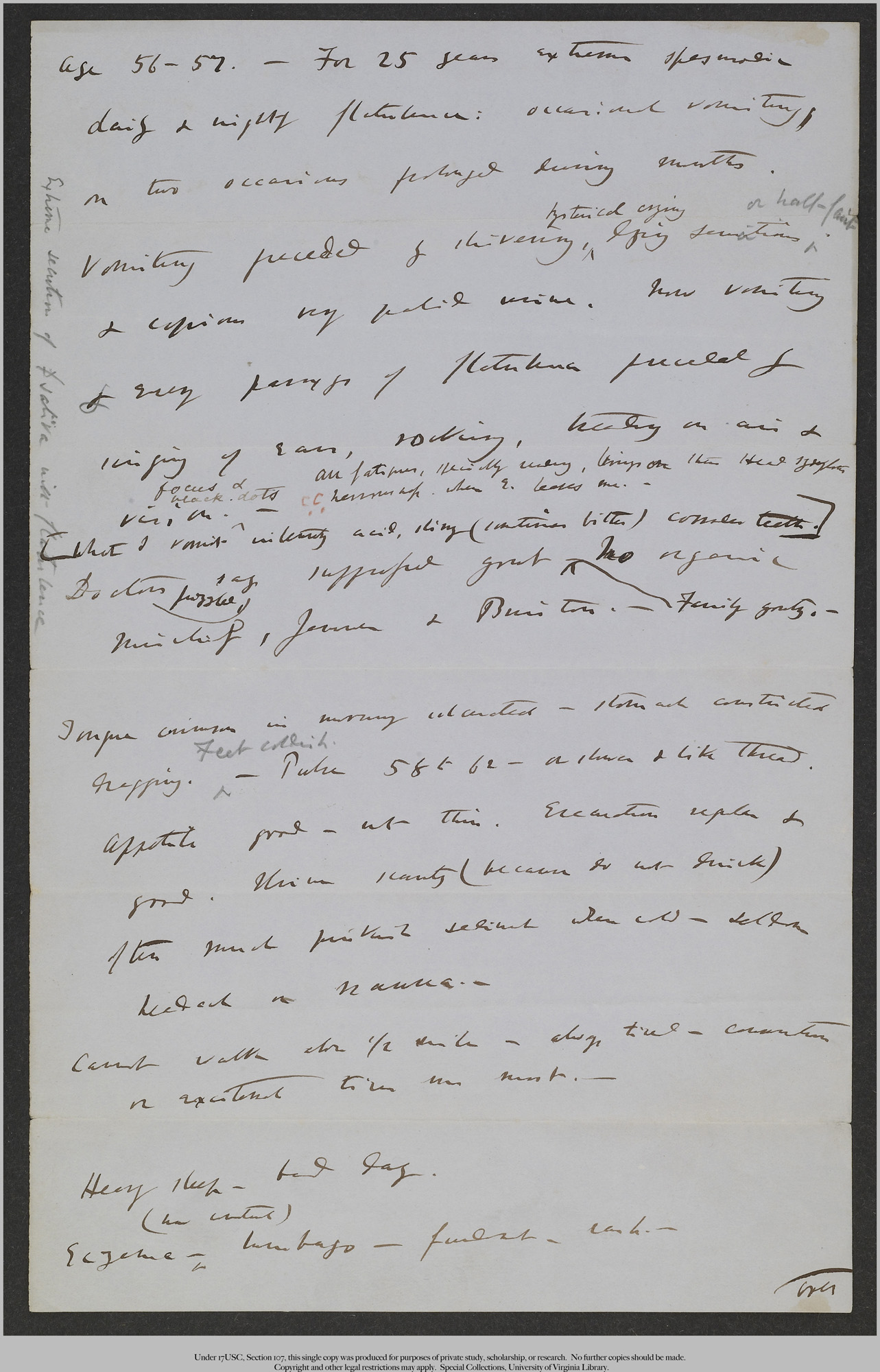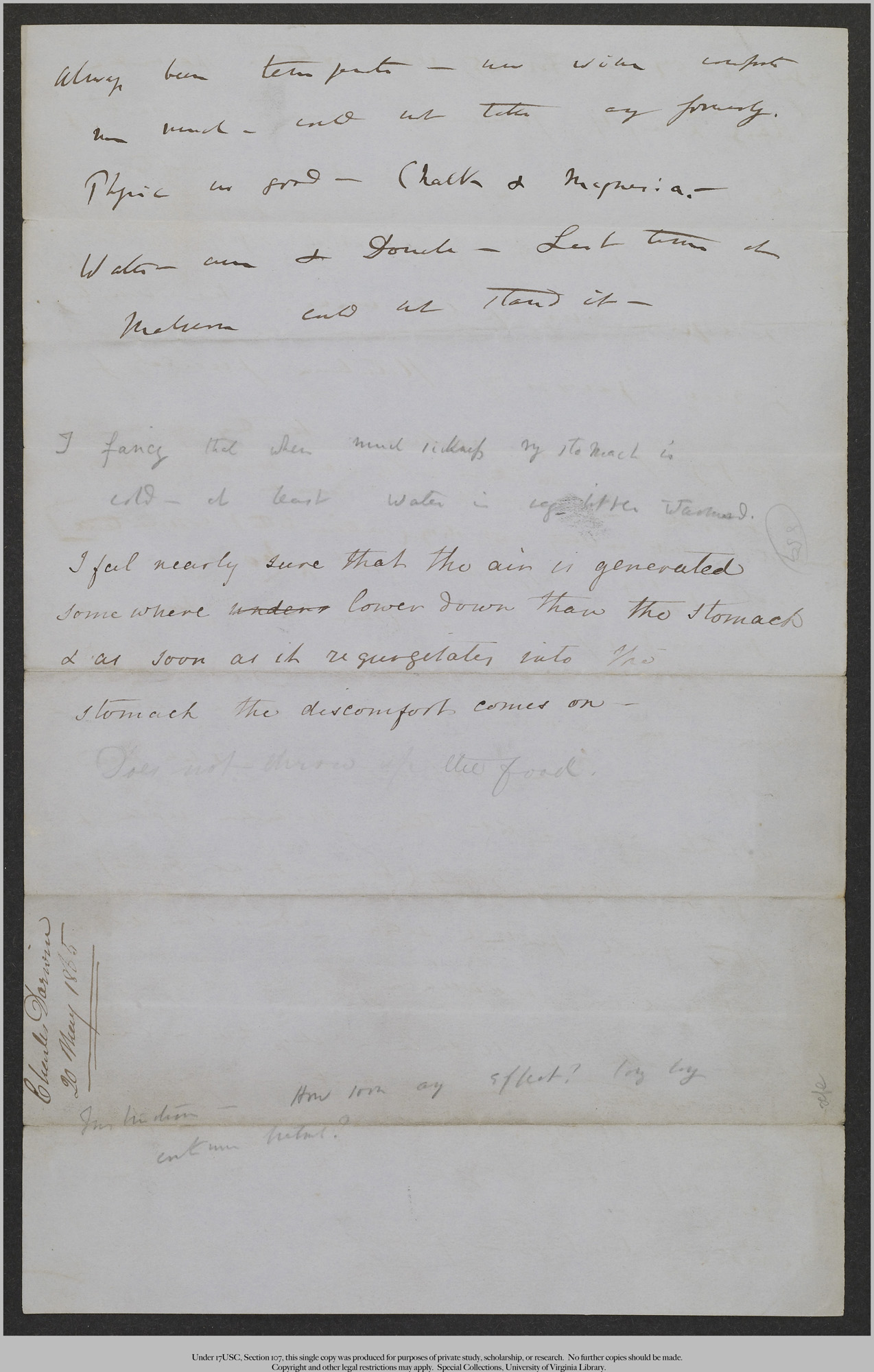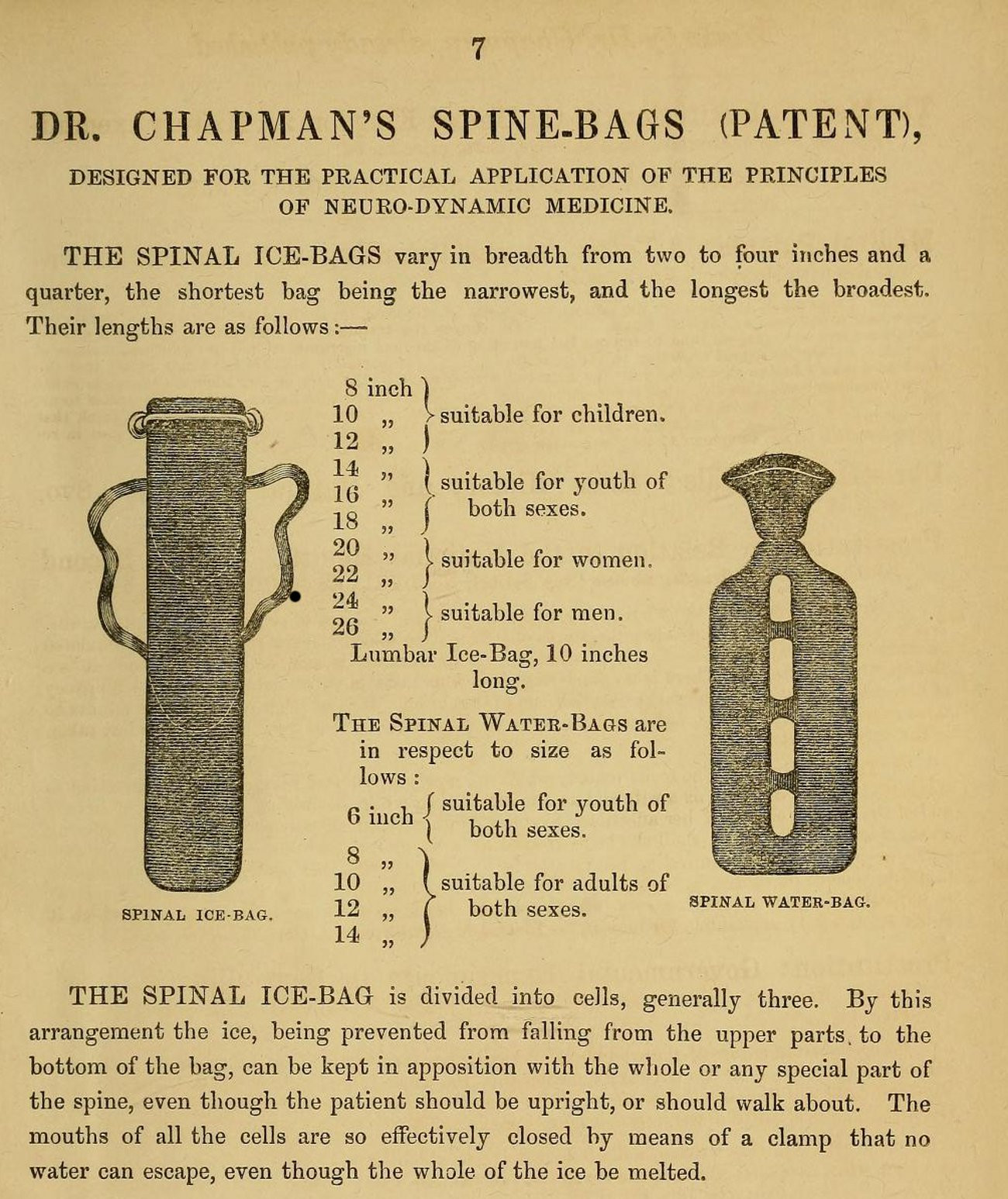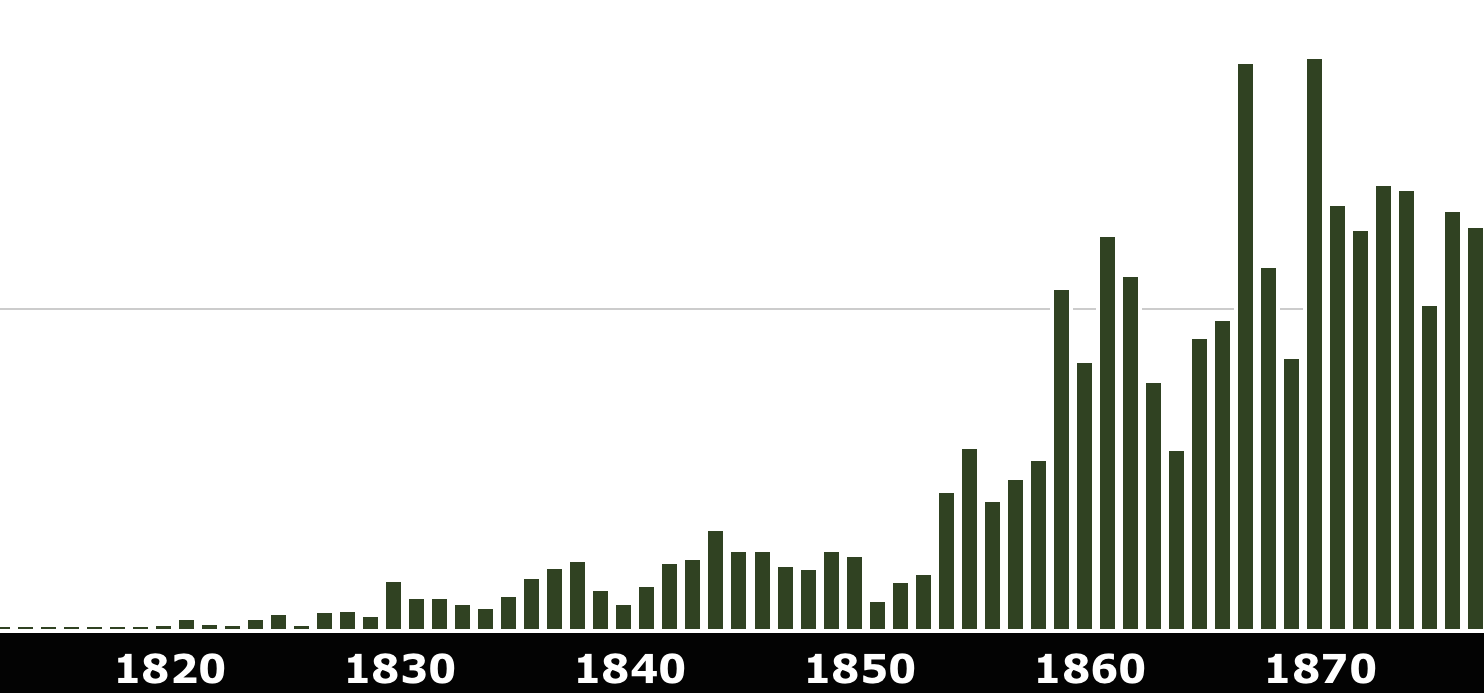On 20 May 1865, Emma Darwin recorded in her diary that John Chapman, a prominent London publisher who had studied medicine in London and Paris in the early 1840s, visited Down to consult with Darwin about his ill health. In 1863 Chapman started to treat epilepsy with ice and developed a theory of 'neuro-dynamic medicine' according to which many diseases were treatable through applications of heat or cold to the spine over long periods.
Chapman wasn't the first medical practitioner Darwin contacted around this time. In 1863, Darwin experienced a period of severe illness, which improved by March 1864 under the care of the physician William Jenner. In November and December of 1864, however, his health grew worse. In his 'Journal', Darwin wrote that he fell ill again on 22 April 1865 and was unable to 'do anything.' Emma Darwin's diary records that he experienced almost daily attacks of vomiting from 21 to 30 April. On 16 May having suffered more attacks of vomiting and seeking another opinion, Darwin wrote to Chapman. On the day that Chapman visited, Darwin wrote out the following account of the various symptoms of the illness that had extended over most of his adult life (the section, 'I feel nearly … food', is in Emma Darwin's hand).
Darwin began the ice treatment on 20 May 1865. In his letter to Chapman of 7 June 1865, he reported that the ice had failed to stop either flatulence or sickness. By the second week of July, he had evidently given up the treatment (see letter from Charles and Emma Darwin to J. D. Hooker, [10 July 1865]).
Darwin's condition had been diagnosed as 'suppressed gout' by Henry Holland in 1849 (Correspondence vol. 4, letter to W. D. Fox, 6 February [1849]). According to some medical literature of the period, stomach disorders such as dyspepsia and flatulence could be caused by the same accumulation of toxic substances that, in outward attacks of gout, caused pain and inflammation of the joints (see, for example, Holland 1855, p. 233, and Garrod 1863, pp. 263-4). The diagnosis of suppressed gout may also have been made more recently by William Brinton, William Jenner, and George Busk (see letter to J. D. Hooker, [7 January 1865], and letter from George Busk, 28 April 1865).
In November and December 1863, Darwin had consulted the stomach specialist, Brinton, who had prescribed mild acid solutions to aid digestion (Correspondence vol. 11, Emma Darwin to W. D. Fox, 8 December [1863]). In his letter to J. D. Hooker, 10 [November 1863] (Correspondence vol. 11), Darwin wrote that Brinton did not believe his brain or heart to be 'primarily affected'. In March 1864, Darwin began to consult Jenner, who prescribed alkali and purgative substances in conjunction with dietary restrictions (see Correspondence vol. 12, letter to J. D. Hooker, 13 April [1864], letter from William Jenner to [William Walmisley Baxter?], [after 7 May 1864?], and letter from William Jenner, 14 August 1864). In his letter to J. D. Hooker, 26[-7] March [1864] (Correspondence vol. 12), Darwin remarked that Jenner had found 'no organic mischief'.
A wide range of modern medical explanations have been given for CD's symptoms; for references to the extensive literature on CD's health, see Colp 1977 and 1998, and Bowlby 1990.
 Age 56-57. - For 25 years extreme spasmodic daily & nightly flatulence: occasional vomiting; on two occasions prolonged during months. Extreme secretion of saliva with flatulence Vomiting preceded by shivering, hysterical crying dying sensations or half-faint. & copious very palid urine. Now vomiting & every paroxys[m] of flatulence preceded by singing of ears, rocking, treading on air & vision. focus & black dots All fatigues, specially reading, brings on these Head symptoms ?? nervousness when E. leaves me.
Age 56-57. - For 25 years extreme spasmodic daily & nightly flatulence: occasional vomiting; on two occasions prolonged during months. Extreme secretion of saliva with flatulence Vomiting preceded by shivering, hysterical crying dying sensations or half-faint. & copious very palid urine. Now vomiting & every paroxys[m] of flatulence preceded by singing of ears, rocking, treading on air & vision. focus & black dots All fatigues, specially reading, brings on these Head symptoms ?? nervousness when E. leaves me.
(What I vomit intensely acid, slimy (sometimes bitter) corrodes teeth.)
Doctors puzzled, say suppresssed gout Family gouty. No organic mischief, Jenner & Brinton.
Tongue crimson in morning ulcerated- stomach constricted dragging. Feet coldish.-Pulse 58 to 62-or slower & like thread. Appetite good-not thin. Evacuation regular & good. Urine scanty (because do not drink) often much pinkish sediment when cold- seldom headach or nausea.-
Cannot walk above ½ mile- always tired- conversation or excitement tires me most.
Heavy sleep- bad day.
Eczema- (now constant) lumbago- fundament-rash.
 Always been temperate- now wine comforts me much- could not take any formerly. Physic no good Chalk & Magnesia. Water-cure & Douche- Last time at Malvern could not stand it
Always been temperate- now wine comforts me much- could not take any formerly. Physic no good Chalk & Magnesia. Water-cure & Douche- Last time at Malvern could not stand it
I fancy that when much sickness my stomach is cold-at least water is very little warmed.
I feel nearly sure that the air is generated somewhere lower down than the stomach & as soon as it regurgitates into the stomach the discomfort comes on-
Does not throw up the food.
Instruction- How soon any effect? long long continue treatment?
The manuscript note is in the University of Virginia Library, Albert and Shirley Small Special Collections Library, Darwin Evolution Collection (3314) and is reproduced here by permission.
Selected letters about Darwin's ice treatment:
4834 Darwin asks John Chapman to pay him a professional visit 'to consider whether the ice treatment would be applicable in my case': 16 May [1865]
4837 Darwin writes to Thomas Huxley about Chapman, hoping that his 'health will receive some considerable improvement from the application of ice to the spine':27 May [1865]
4846 Darwin relays to Joseph Hooker that he has been trying Chapman's ice-bag remedy 'at first with strong hope, now with weak hope': 1 June [1865]
4854 Darwin gives a detailed report to Chapman about his health conditions under the ice treatment. He still suffers from bouts of vomiting and fits of flatulence: 7 June 1865
4862 Darwin in a letter to Joseph Hooker has 'had a very bad 6 weeks with much vomiting & fear that the ice will not do much for me': [17 June 1865]
4868 Darwin and Emma write to Joseph Hooker about the dire state of Darwin's health. Emma reports that they are 'quite sorry the ice failed' in the end: [10 July 1865]




